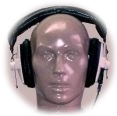
What happens when hearing is damaged by noise?
Some typical effects are:
Getting things wrong that people tell you
Not being able to join in conversations in noisy surroundings
Not being able to understand young children's speech
Losing sleep due to tinnitus
How is the damage done?
Noise damages the nerve cells that respond to sound in the inner ear, or cochlea. These cells work in a complex way, to give us the ability to discriminate between sounds of different pitch. So when they're damaged it doesn't just mean that you can't hear quiet sounds - it has more subtle effects on the clarity of hearing.
This clarity can't be restored by an electronic aid. Although the best modern hearing aids are very clever, they still don't restore normal undamaged hearing.
We don't know exactly how the damage is done. It is easy to understand that the vibration of extremely loud sounds causes direct mechanical damage. It breaks the sub-microscopic parts of the "hair cells" that respond to sound. But the cells can also be damaged by excessive stimulation at a lower level. This damage can build up gradually, even over a period of years.
This is why the law sets (a) an absolute maximum level of sound that must not be exceeded, and (b) a "dose" limit that depends on the duration as well as the level of the noise.
What sort of noise usually causes problems?
It's not just noisy work in factories or building sites that can put peoples' hearing at risk. A 1999 report by the RNID and TUC (Indecent Exposure) highlighted how a wide range of work, including "new" industries such as call centres and the entertainment industry, can give excessive (and, if not properly dealt with, illegal) noise exposure.

Any loud sound can cause problems. This includes sounds that you wouldn't normally think of as "noise", such as music, and speech heard on earphones or loudspeakers. As far as the noise at work legislation is concerned, these are like any other noise.
When the risk to hearing comes from speech or music - in many cases, the very sound that people need to hear to do their job - it can be difficult to deal with. But those whose livelihood depends on good hearing can't afford to take risks with their ears - and neither, of course, can their employers. I specialise in dealing with situations where people need to hear and communicate while still protecting their ears against the hazard of excessive sound level.
More information:


All pages on this web site copyright Tony Woolf 2000 to 2007.




